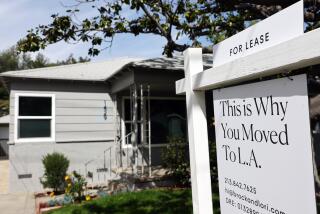Reverse Annuity Mortgage Aimed at Senior Citizens
QUESTION: I have tried to obtain information about reverse annuity mortgages from several financial institutions with no success. Could you please explain these types of loans and direct me to institutions offering them in California?--G. J.
ANSWER: It’s not surprising that you’ve had difficulty learning more about these mortgages. They are complex, controversial and fairly uncommon. But we’ve dug up what we could.
Reverse annuity mortgages were designed in the late 1970s to help senior citizens who have accumulated substantial equities in their homes but need additional cash to meet their monthly living expenses. These mortgages allow the homeowners to spend that equity without selling their homes.
Here’s how they work. A lending institution makes the homeowner a loan for up to 80% of its appraised value, typically for 5, 10 or 12 years. The institution, which takes its loan fees and points on the full amount when the loan is approved, then pays the homeowner the balance of the loan in equal monthly installments--minus accruing interest on the already dispersed funds--for the remaining term. The loan--actually the amount dispersed plus interest--can be repaid early if the house is sold by the owner or his heirs. Otherwise, the homeowner is liable to repay the full amount when the loan term expires or face foreclosure.
Here’s a real-life example. The homeowners, a San Francisco Bay Area couple, qualified for a $150,000 loan at 10.5% interest in 1987. They paid a total of $3,450 in loan fees and closing costs from the loan proceeds and are receiving $430.51 each month for 10 years. If the loan is not repaid earlier, the couple is responsible for repaying the full $150,000 to the bank in 1997.
It is very important to realize that reverse annuity mortgages are not for everyone.
Typically, lenders and senior-citizen counselors say the loans are best suited for a very elderly person--at least 75 years old--who is not expected to outlive the term of the loan. The ideal candidate, lenders say, needs the loan proceeds to pay for nursing care or housekeeping assistance that will allow him to remain in his home for as long as possible.
“They are not a good solution for people who are healthy and have a long life expectancy,” said Ann Winchester, vice president of First Nationwide Savings, which is believed to be the only lender in California now offering reverse annuity mortgages.
Tricia Smith, a counselor with the California Home Equity Conversion Coalition, a San Francisco organization helping to promote these loans, added another caveat: “It should be clear to all involved that homeowners whose life expectancy is more than the term of the loan face having to sell their home in order to repay the loan.” Furthermore, the homeowners and their families should fully understand that the home equity is being depleted and that the elderly homeowner is quite literally spending his children’s or other heirs’ inheritance.
Because of the potential problems posed by these loans, First Nationwide Savings refuses to make them unless a customer and his immediate family are screened and counseled by one of several nonprofit groups established in Northern California to advise senior citizens. Other lenders have simply refused to get involved rather than face the prospect of forcing a homeowner to sell his house if he should outlive the term of the mortgage.
“What lender is going to want to kick out some frail senior citizen when the mortgage elapses?” asked Mark Chappell, senior director of the Mortgage Banking Assn. in Washington.
American Homestead Corp. in Mount Laurel, N.J., offers the loans in eight East Coast states, and its president, James Burke, said he may soon expand into the California market.
Incidentally, Burke said American Homestead has gotten around the sticky issues of the fixed-term mortgage by offering an open-ended loan that continues to pay the homeowner the agreed upon amount as long as he continues to occupy the home. In exchange for offering an open-ended loan, American Homestead is guaranteed a share of any appreciation the home may accrue during the course of the loan.
Reverse annuity mortgages are still quite rare in Southern California. Life Services Inc. in Burbank offers counseling to qualifying homeowners for a fee, and a counseling program is currently being organized in the City of Orange. Lenders are still being lined up.
For additional information, write to the California Home Equity Conversion Coalition, 4429 Cabrillo St., San Francisco, Calif. 94121. Another source of information is the Consumer’s Guide to Home Equity Conversion, available from the Consumer Affairs Department of the American Assn. of Retired Persons, 1909 K St. N.W., Washington, D.C. 20049.
More to Read
Inside the business of entertainment
The Wide Shot brings you news, analysis and insights on everything from streaming wars to production — and what it all means for the future.
You may occasionally receive promotional content from the Los Angeles Times.










